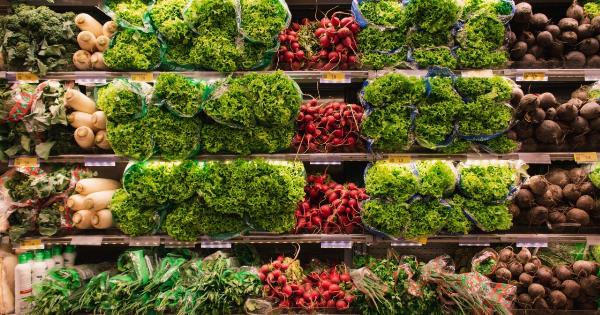In today’s modern and fast-paced world, it’s become increasingly common for people to consume diets that are high in salt, sugar, and trans fat.
These three culprits play a significant role in the development of various health problems, including heart disease, obesity, and diabetes. In this article, we will explore the negative effects of salt, sugar, and trans fat on our bodies and discuss strategies to minimize their intake and make healthier choices.
1. The Dangerous Effects of Salt
Salt, also known as sodium chloride, is a staple ingredient in many cuisines, and it enhances the taste of various dishes. However, excessive salt consumption can have detrimental effects on our health.
High salt intake is strongly associated with an increased risk of high blood pressure, which is a leading cause of heart disease and stroke. Additionally, excessive salt intake can contribute to the development of kidney problems, osteoporosis, and stomach cancer.
To minimize salt intake, it is important to read food labels carefully and choose products with lower sodium content. Cooking at home allows better control over the amount of salt added to meals.
Incorporating more fresh fruits, vegetables, and herbs in our diets can add flavor without excessive salt. Limiting the consumption of processed and pre-packaged foods, which are often high in salt, is also crucial for reducing overall salt intake.
2. The Sweet Temptation: Sugar
Sugar is another culprit that has become a major concern in our diets. Consuming excessive amounts of added sugars can lead to weight gain, obesity, type 2 diabetes, and even dental problems.
It is crucial to differentiate between naturally occurring sugars, such as those found in fruits, and added sugars, which are commonly found in processed foods and beverages.
Minimizing sugar intake begins with reducing the consumption of sugary beverages, such as soda, energy drinks, and sweetened juices. These beverages are often loaded with added sugars and provide empty calories.
Opting for water, unsweetened tea, or infusing water with fresh fruits can be a healthier alternative. When it comes to packaged foods, reading labels and being aware of different names for added sugars, such as high fructose corn syrup or sucrose, is essential. Choosing whole foods over processed snacks and desserts can also help reduce sugar intake.
3. Tackling Trans Fat: The Silent Killer
Trans fat is a highly dangerous type of fat that is commonly found in processed and fried foods, such as fast food, baked goods, and margarine.
It is artificially produced through a process called hydrogenation, which turns liquid oils into solid fats to enhance shelf life and improve texture. However, trans fat has been linked to numerous health problems, including heart disease, stroke, and an increased risk of developing type 2 diabetes.
The best way to minimize trans fat intake is to avoid consuming foods that contain partially hydrogenated oils, as they are the primary source of trans fat.
Reading food labels and choosing products that explicitly state “trans fat-free” is advisable. Opting for healthier cooking oils, such as olive oil or coconut oil, for home cooking and reducing the consumption of fried and processed foods is also essential for combating trans fat intake.
4. Making Healthier Food Choices
Minimizing salt, sugar, and trans fat is a crucial step towards a healthier diet, but it is equally important to make conscious choices and incorporate nutrient-rich foods. Here are several tips to help you make healthier food choices:.
4.1. Eat a Balanced Diet
Focus on consuming a variety of whole foods, including fruits, vegetables, whole grains, lean proteins, and healthy fats. Each food group provides essential nutrients that our bodies need to function properly.
4.2. Cook at Home
Preparing meals at home allows better control over ingredients and portion sizes. This way, you can reduce the amount of salt, sugar, and trans fat in your meals, and avoid the hidden sources of these harmful substances.
4.3. Stay Hydrated with Water
Water is the best beverage for staying hydrated without any added sugars or calories. Make it a habit to drink water throughout the day and limit the consumption of sugary beverages.
4.4. Snack Smart
Instead of reaching for processed snacks high in salt, sugar, and trans fat, opt for healthier alternatives. Choose fresh fruits, raw nuts, or homemade snacks like air-popped popcorn.
4.5. Read Food Labels
Develop the habit of reading food labels to check the sodium, sugar, and trans fat content of packaged products. Pay attention to the serving size to get an accurate understanding of what you are consuming.
4.6. Be Mindful of Hidden Sugar
Added sugars can often be hidden in products that are not typically associated with sweetness, such as salad dressings, pasta sauces, and condiments. Read labels carefully to identify and minimize hidden sources of sugar.
4.7. Choose Healthier Cooking Methods
Opt for grilling, baking, steaming, or sautéing instead of frying when preparing meals. This reduces the amount of unhealthy fats consumed and retains more nutrients in the food.
4.8. Enjoy Moderation
While it is essential to minimize salt, sugar, and trans fat, it is also important to allow ourselves the occasional indulgence. Enjoying a small portion of your favorite treat or meal occasionally can help maintain a balanced approach to eating.
4.9. Seek Support
Changing eating habits can be challenging, so finding support from friends, family, and health professionals can make a significant difference.
Share your goals, seek advice, and encourage each other on your journey to minimize salt, sugar, and trans fat intake.
4.10. Lead by Example
If you have children or loved ones in your life, being a positive role model is key. By making healthier choices and minimizing the consumption of salt, sugar, and trans fat, you can inspire others to do the same.
In conclusion, salt, sugar, and trans fat have become major culprits in our diets, contributing to the rise of various health problems.
By minimizing their intake and making healthier choices, we can protect our bodies from the harmful effects associated with excessive consumption. Remember, small changes can make a big difference in promoting a healthier lifestyle for yourself and those around you.



























